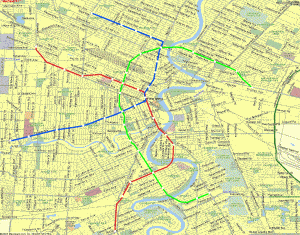ReInventing The Wheel by The MindHacker
ReInventing The Wheel. So Rapid Transit in Winnipeg is a hot topic lately. At the moment there's a debate on about the benefits of Bus Rapid Transit vs. Light Rail Transit. Many people I've spoken to think that the plans (if you can call them that) for either side of the debate still fall short of what's really required. If you look back to some plans that were made by Norman Wilson (the man who designed the Toronto subway) in 1959, and compare them to what we've seen from recent administrations, you will get the feeling that there's something...lacking.

Reading through Wilson's plans, they are detailed, and all have solid logical reasons behind all the decisions made. Read this excerpt from the beginning:
Prior to the introduction of public transit service, cities of necessity were limited in size and greatly overcrowded. People were compelled to live close to their place of daily work, for few could afford the up-keep of private means of transportation.....But the motor vehicle has created its own problems namely ever increasing street congestion and insatiable need for parking space. The street system inherited from the past is now fully used. The improvement of traffic conditions, however accomplished, and the provision of additional parking space, has up to the present, resulted only in the "bringing out" of additional motor vehicles to at once load to capacity the new facilities, with relatively little if any improvement over previous conditions....The service provided by a transit vehicle that is locked in congestion for minutes at a time, and takes double its normal time to make its half-round trip, is far from being satisfactory service to the passengers on board it who at least have some idea as to the reason for the slow out-bound trip, and is most unsatisfactory service to would-be passengers waiting for that bus to arrive on its in-bound trip, with no reason visible for its being behind time...On an evening in November last I boarded an Osborne trolley bus about five o'clock at Dufferin Avenue and Salter Street. Two very competent-appearing business girls were in the seat ahead of mine. As the bus inched along Isabel Street in a very extended traffic jam, locked in a phalanx of motor vehicles, I overheard one girl say to the other, "This settles it. I am going to buy myself a car." No explanation was forthcoming as to how a car would expedite her home-going under the existing or similar circumstances.
Throughout the entire 80 or so page report there are tables, analysis of different technologies, and strategies for things like river crossings (above or below), and all are backed up with the mounds of research that Norman did for the city.
Shelved.
Apparently it hasn't been the only plan that was done for Winnipeg either, over the past 50 years there have been a few. I think what we are seeing today, with the flip flops, and lack of vision and real planning is a result of our Winnipeg culture. Winnipegers are proud about the fact that they find deals everywhere. They want things cheap.
Rapid transit does not come cheap, but it can transform a city. It makes travel into the city down town easier, faster, and much more convenient. If you're wondering why is the downtown effectively shut down at 5pm every day? Without rapid transit, and train stations there's not enough of a critical mass of people to keep it safe. So everyone just avoids it and spends time in other neighborhoods.
Think about the West End for a moment now. Part of the problem with that area is that there is very little in the way of primary residences, ie there are a lot of rentals. In Real Estate we have a rule called the 900meter rule. This rule essentially states that when Rapid Transit is finally created in a city, wherever there are train stations planned, within 900m of those stations the property values will increase somewhere around 30%. All of the sudden places like the West End start to look very attractive to people who wish to own homes. Businesses spring up around the stations. Culture, and commerce push the criminal elements out of the neighborhood, further increasing property values, which also increases the taxes collected. This could happen all over the city (look at the map, and where the stations had been planned).
In my mind, there's no reason not to start Rapid Transit NOW. But the way we've begun it is wrong. We're re-inventing the wheel on it, and, at the same time not planning it out carefully enough.
If these RT plans fail, I for one will be moving away from Winnipeg.

